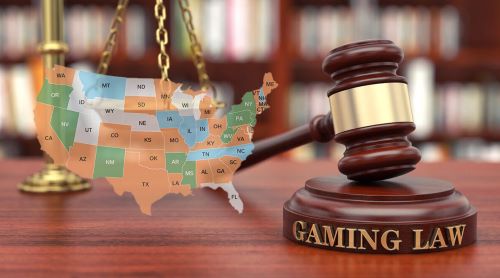

In the United States, the tapestry of online gambling laws is as diverse and intricate as the nation itself. Navigating this landscape requires an understanding not just of the broad strokes but of the subtle nuances that differentiate one state’s approach from another’s.
This article aims to unravel this complex web, offering a state-by-state guide to the online gambling laws that govern the virtual gaming tables and sportsbooks of America. We’ll delve into the legal peculiarities that define this sector and underscore the indispensable role of reliable platforms in keeping players well-informed and within the bounds of legality.
The Federal Framework and Its Impact
The bedrock of the U.S. online gambling landscape is formed by a trio of federal laws, each playing a crucial role in shaping the industry’s contours. From the Wire Act’s early crusade against organized crime’s betting operations to UIGEA’s financial safeguards and PASPA’s dramatic fall, which unleashed the sports betting juggernaut, these laws have collectively forged a complex legal backdrop against which each state’s regulations are painted.
Understanding the Wire Act and UIGEA
At the federal level, legislation like the Wire Act of 1961 and the Unlawful Internet Gambling Enforcement Act (UIGEA) of 2006 set the stage for how online gambling operates in the U.S. The Wire Act, initially aimed at curtailing organized crime, prohibits the use of wire communications for placing bets across state lines. UIGEA, on the other hand, does not outlaw online gambling but restricts financial transactions with illegal gambling sites, putting a burden on banks and payment processors to vet their clientele.
The Fall of PASPA and the Rise of Sports Betting
A landmark moment in U.S. gambling history came with the 2018 Supreme Court decision to overturn the Professional and Amateur Sports Protection Act (PASPA). This act had effectively banned sports betting nationwide, but its repeal opened the floodgates for states to legalize and regulate sports betting as they saw fit. The post-PASPA era has seen a burgeoning sports betting industry take shape, with various states embracing this form of gambling to varying degrees.
Online Sports Betting: A State of Flux
Sports betting in the U.S. is an evolving tapestry, with some states boldly leading the charge while others adopt a more cautious, deliberative stance. This section examines the states at the forefront of this burgeoning industry and those still grappling with the complexities of regulatory implementation.
States Leading the Charge
States like New Jersey, Pennsylvania, and Michigan have been pioneers in legalizing and operationalizing online sports betting. Their regulatory frameworks serve as blueprints for other states looking to enter the arena.
New Jersey, Pennsylvania, and Michigan, along with Arizona, Arkansas, Colorado, Connecticut, Illinois, Indiana, Iowa, Kansas, Kentucky, Louisiana, Maryland, Massachusetts, Nevada, New Hampshire, New York, Ohio, Oregon, Rhode Island, Virginia, Washington D.C., and West Virginia offer a broad array of sports betting options, from traditional bookmakers to mobile betting apps, reflecting their commitment to creating a robust and dynamic betting landscape.
The Wait-and-See Approach
Conversely, some states, like Oklahoma and Vermont, have legalized sports betting in principle but are still ironing out the regulatory details. These states are carefully studying the experiences of their early-adopting counterparts, taking measured steps to ensure that when they do launch sports betting operations, they do so with a solid foundation that prioritizes player safety and economic viability.
Online Casinos: Pockets of Legality
The story of online casinos in the U.S. is one of stark contrasts. In a select few states, virtual casinos flourish under the careful watch of regulatory bodies, while in most others, they remain outside the legal purview. This section explores the pockets of legality where online casinos thrive and the broader landscape where they remain prohibited.
Where Online Casinos Thrive
In the realm of online casinos, the U.S. presents a patchwork of legal landscapes. States like New Jersey and Pennsylvania have embraced online casinos, offering everything from slots to live dealer games. These states recognize the economic potential of online gambling and have crafted regulatory environments that protect players while fostering industry growth.
The Majority Stance on Online Casinos
Despite the success stories, most states remain hesitant to legalize online casinos. Concerns over problem gambling, regulatory challenges, and opposition from traditional casino operators have stalled legislative efforts in many regions. As a result, online casino enthusiasts in these states are left waiting for a shift in the legislative tide.
The Online Poker Scene
The fate of online poker in the U.S. has been a rollercoaster, with only a few states embracing it while the majority keep it at arm’s length. This section examines the states where online poker has found a home and the broader context that keeps it from widespread acceptance.
The Few, The Proud
Online poker has a storied history in the U.S., but today it’s only available in a handful of states, including Nevada, New Jersey, and Pennsylvania. These states have created a legal and regulatory framework that allows poker aficionados to play safely and responsibly online.
The Broader Context
For most of the country, online poker remains a distant reality. The complexities of regulating this form of gambling, combined with the need for interstate player pools to ensure liquidity, pose significant challenges for lawmakers. Until these issues are addressed, the status quo is likely to persist.
Online Lotteries: Digital Transformation
The transition of lotteries into the digital realm has been smoother in some states than others, reflecting the varied attitudes towards this traditional form of gambling. This section explores the states leading the digital transformation of lotteries and those that remain committed to the in-person experience.
States Embracing Online Sales
The digitization of the lottery has been one of the more straightforward transitions in the online gambling world. States like Illinois and Michigan have led the way, offering online sales of lottery tickets and even instant win games. These platforms have proven to be both popular and lucrative, demonstrating the potential for digital innovation in traditional gambling formats.
The In-Person Preference
However, numerous states still require in-person purchases for lottery tickets, citing concerns over problem gambling and verification challenges. In these states, the traditional experience of buying a lottery ticket at a local retailer remains the status quo, underscoring the diverse approaches to gambling regulation across the country.
The Role of Reliable Platforms in Player Information

In the labyrinthine world of U.S. online gambling laws, reliable platforms play a critical role in guiding players through the legal minefield. These platforms offer up-to-date information on legal developments, helping players navigate the complexities of state regulations.
Keeping Players Informed
Reliable gambling information platforms provide a valuable service by keeping players abreast of the latest legal updates, developments in state regulations, and changes in the gambling landscape. This is crucial in states like Pennsylvania, where the legal framework is complex and ever-evolving. Players rely on these platforms for insights that ensure they remain on the right side of the law while enjoying their favorite games.
The Importance of Legal Insights
Understanding the legal framework for real money casinos is essential for players looking to enjoy a safe and legal gaming experience. One of the first movers was Pennsylvania, which has an active and respected gambling regulator. The Pennsylvania Gaming Control Board ensures that the sites they oversee are safe. You can click here to find the best regulated real money casinos in PA.
State-Specific Legal Developments
The fluid nature of U.S. online gambling laws means that developments can emerge rapidly, with states frequently revising their legal frameworks. This section takes a closer look at some of the most recent legal shifts and their implications for players and operators alike.
Recent Legislative Changes
From the legalization of sports betting in new states to the expansion of online casino licenses, the legal landscape is in a state of constant flux. These changes reflect a growing recognition of the economic benefits of regulated gambling and a desire to protect players through robust regulatory frameworks.
Implications for the Industry
Each legislative shift has far-reaching implications for the gambling industry, shaping market dynamics and influencing the strategies of operators. Staying abreast of these developments is crucial for anyone with a stake in the future of U.S. online gambling, from players to investors to regulatory bodies.
Navigating the Legal Maze: Final Thoughts

The patchwork of U.S. online gambling laws presents a complex maze for players, operators, and regulators alike. This comprehensive guide has aimed to shed light on the varied legal landscapes that define this sector, emphasizing the importance of staying informed and recognizing the pivotal role of reliable platforms in guiding stakeholders through this intricate tapestry.
The Path Ahead
As the U.S. online gambling industry continues to mature, the path ahead will likely be marked by further legislative changes, technological innovations, and shifts in player preferences. Navigating this ever-evolving landscape requires vigilance, adaptability, and a deep understanding of the legal nuances that shape the sector.
A Call to Stay Informed
For players and stakeholders alike, the call to action is clear: stay informed, seek out reliable sources of information, and approach the world of online gambling with a keen awareness of its legal complexities. Only by doing so can one fully embrace the opportunities and navigate the challenges that this dynamic industry presents.
The U.S. online gambling scene is a tapestry woven with threads of varying hues, each representing the unique legal stance of a state. From the green pastures of legal online sports betting and casinos in states like Pennsylvania and New Jersey to the red tape still binding online poker and casino games in many others, this landscape is constantly shifting, shaped by new legislation, judicial decisions, and the evolving preferences of players.
In such a dynamic environment, the importance of reliable, up-to-date platforms for player information cannot be overstated. These resources are not just luxuries but necessities for those seeking to partake in online gambling legally and safely.
In this intricate patchwork, Pennsylvania emerges as a particularly interesting case. With its rich array of regulated real money casinos, Pennsylvania stands as a testament to the economic and recreational benefits of well-regulated online gambling.
Understanding the legal framework of real money casinos is essential for players looking to enjoy a safe and legal gaming experience. This is especially important in states like Pennsylvania, where players rely on platforms for the latest legal updates and insights. For those keen to explore the virtual gaming floors of the Keystone State, reliable sources offer a gateway to finding the best regulated real money casinos in PA.
The road ahead for online gambling in the U.S. is neither straight nor narrow. It is a winding path through a legal landscape that is as varied as the country itself. But with the right tools and knowledge at their disposal, players and stakeholders can navigate this terrain with confidence, ready to embrace the opportunities that regulated online gambling has to offer.


